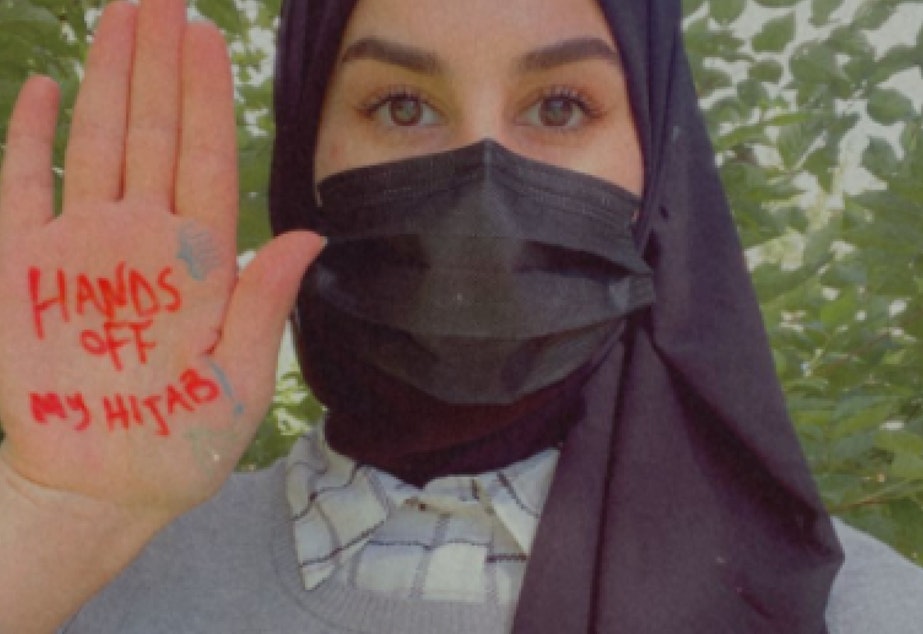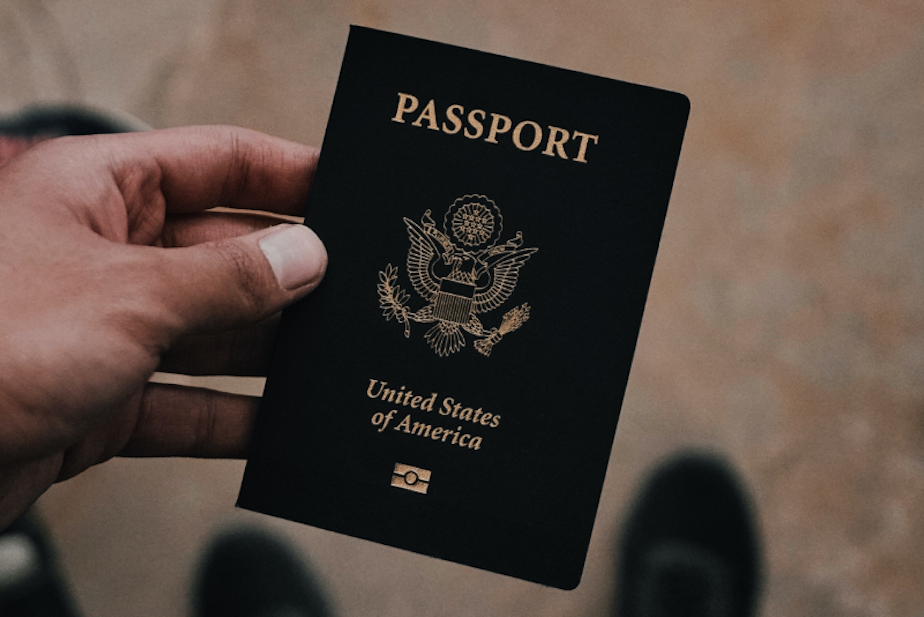Washington's new plan to make money from its trees: Today So Far

- Washington earns a lot of revenue by leasing its public land for logging. But a new plan could change the way forests make money for the state, while combatting climate change.
- With dwindling officers, and a focus on visible crime, investigating sex crimes has become much less of a priority in Seattle.
- Gig Harbor residents didn't let vandals deter their message of hope for the Ukrainian people.
This post originally appeared in KUOW's Today So Far newsletter for April 11, 2022.
After a mural was painted in Gig Harbor, expressing support for the Ukrainian people, it was vandalized. But locals didn't let that deter their message of hope.
Artist Hillarie Isackson runs the Hart Studio art gallery in Gig Harbor. After hearing that some Ukrainians would be coming to town after fleeing the war-torn country, she painted a mural showing the outline of Ukraine, with flowers and the country's yellow and blue colors. The mural lasted two days before vandals smudged bands of red, white, and blue plaint over it; the same theme of the Russian flag (though they screwed up the pattern).
The community wasn't going to let it stand. Volunteers stepped up to help. And Isackson spent 15 hours straight painting a new mural, with the goal to have it completed before a Ukrainian relative arrived. The new mural incorporates the U.S. flag, Ukrainian colors, and flowers. It bears the original message: “Stand with Ukraine. Love will prevail.” Read more here.
Investigating sex crimes has become much less of a priority in Seattle.
The Seattle Police Department has experienced a significant loss of officers over the past couple years. Now the city has a new mayor, a new direction, and a focus on visible crime like organized retail theft.
But not all crimes have been garnering full attention from SPD. As KUOW's Ashley Hiruko reports, arrests for sex crimes involving children and adults have massively declined over the past year, and Seattle police are forwarding fewer cases to the prosecutor's office. So far in 2022, 1.6% of sexual assault cases and child abuse have resulted in an arrest. That's down from 14% in 2019. Beyond that, sources inside SPD tell KUOW that cases involving adults are simply not being assigned to detectives these days. After KUOW published its story on the issue, the mayor's office was prompted to make a statement. Read the full story and the response here.
Washington state makes a lot of money by leasing its public land for logging. It uses the funds for schools, libraries, hospitals, and more. Which sounds good, but then again, the state does hype its climate change awareness. And cutting down a lot of trees doesn't help with our climate change goals.
Washington's Commissioner of Public Lands Hilary Franz has a new approach. The state will lease public land to corporations, like a sponsorship. Through conserving this land, those corporations will get credit for offsetting their carbon emissions. A total of 10,000 acres of Washington's forests have been set aside for this plan. The state could potentially end up making more money this way than it did from logging.
Seattle Times Reporter Lynda Mapes recently told Seattle Now that preserving "legacy forests" (old, but not old growth forests) is a valuable tactic in combatting climate change. She noted that about 30% of fossil fuel emissions are taken in by trees.
"They are using the CO2, the carbon in the air, as their food ... and stash that carbon away through the magical zap of photosynthesis to convert it to leaves, roots, branches ... That's right where that carbon stays as long as that tree lives. And then even after it dies, it's locked up in the decaying wood and then it stays in the soil ... that is what we are accomplishing whenever we let a tree grow. That is why something like this carbon reserve can help us blunt the worst effects of climate change..."
Hear the full conversation here.
AS SEEN ON KUOW

In a recent episode of KUOW's RadioActive, Rahmah Abdulazeez presents a poem she wrote after a conversation with her sister Zahraa (above) about wearing a hijab and the perceptions, assumptions, and discrimination they face. (Courtesy of Rahmah Abdulazeez)
DID YOU KNOW?
It was 125 years ago, on April 11, 1897, that our region got its first naval ship, the USS Oregon, finalizing years of work that went into founding the Puget Sound Naval Shipyard. It also proved to be a big payday for two businessmen who took a gamble on the area.
The United States government wanted to build a naval shipyard in the Northwest and set its sights on what is now the Bremerton area. But the Navy ran into a problem — settlers. The region was home to the Suquamish people for countless generations before the Treaty of Point Elliott opened it up for settling in 1855. That meant settlers had been hanging around for a couple decades before the Navy came along, offering to pay them $50 per acre for their land. But the settlers knew the government really wanted the land. So they got together and agreed to press the U.S. for $200 per acre.
That's when William Bremer and Henry Paul Hensel stepped in and bought all the land for the expensive $200-per-acre price. They then turned around and sold some of it to the Navy at the $50-per-acre price, which meant they lost a lot of money. But they were gambling that a new, large shipyard would spur a new, large city on neighboring land they now owned. It paid off. Bremer even got to name the town after himself — Bremerton. The Puget Sound Naval Shipyard is still there today and the city is the largest on the Kitsap Peninsula.
ALSO ON OUR MINDS

U.S. citizens can now choose the gender 'X' on their passport applications
U.S. citizens applying for a passport can now select the gender "X" on their applications in addition to the previously available "F" and "M" options. The State Department announced last year that it was adding a third gender option following a lawsuit by an intersex and nonbinary Colorado resident who argued that it was impossible to get a passport that accurately reflected their gender identity.

